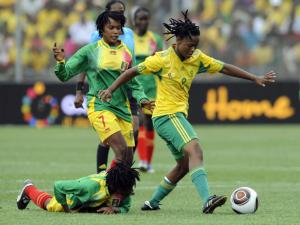
Another packed house at Sinaba Stadium was on hand to support Banyana Banyana in the last match of the group stage of the 2010 African Women’s Championship. Needing only a draw to qualify for the semifinals, South Africa defeated Mali 4-0 to take second place in the group behind Nigeria (3-0 winners over Tanzania). South Africa are one win away from qualifying for the 2011 Women’s World Cup in Germany.
While the scoreline suggests a one-sided affair, Mali and South Africa battled it out fairly evenly for 75 minutes. Ayanda Dlamini, making her first start of the tournament, put Banyana ahead with a nice header in the 32nd minute and it was 1-0 at the break.
The second half was marked by some rough and undisciplined play, with Mali earning four yellow cards and one red. As the West Africans grew more frustrated, Dlamini knocked in a loose ball from five yards out in the 77th minute to put the game beyond reach. Crisp finishing from substitute Seoposenwe (85th) and Sister (89th) then gave the 15,000 home fans more reasons to celebrate Banyana’s passage through to the semifinals. Their opponents will be decided tomorrow; probably Equatorial Guinea or Cameroon, although Ghana still have an outside chance.
Update: Click here to get access to AWC video highlights: http://www.supersport.com/football/african-women-champs/fixtures
Category: Hosting
Nigeria 2, South Africa 1
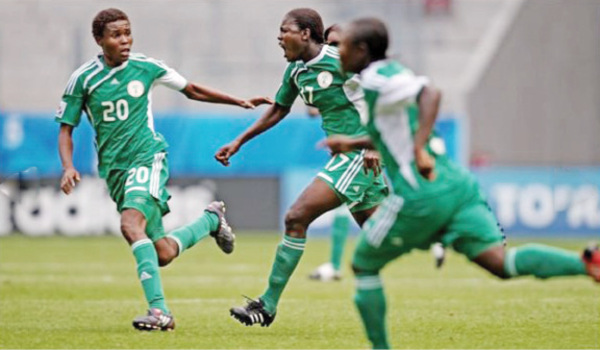
Perpetua Nwkocha was at her stellar best today, scoring two goals as Nigeria defeated South Africa 2-1 at Sinaba Stadium near Johannesburg. The three-time MVP of African Women’s Championships leads the tournament in scoring with five goals in two matches.
The contest was played in a relaxed atmosphere, nothing like the Battle of Vosloruus of 2000. The 15,000 capacity crowd — mostly young men — transformed the ground into a sea of yellow and gold. A small, vociferous group of Nigerian fans countered the vuvuzela cacophony with actual trumpets and drumming.
Banyana started tentatively, but hardly seemed a “desperate team,” as the Nigerian coach said in a pre-game interview. South African goalkeeper Thoko Mndaweni fumbled an easy shot six minutes in, and then failed to come out on a dangerous cross. The Super Falcons moved well on attack, dominating the middle of the park and exploiting their superior speed on the flanks.
Nigeria were rewarded in the 23rd minute, as Nwkocha smoothly finished a 1-on-1, courtesy of an Oji assist and lax marking. Nigeria continued to pile on the pressure, picking up corners and creating chances from their wing play.
Nwkocha made it 2-0 with a towering header off a corner in the 39th minute. Even the home crowd applauded the goal. Five minutes later, Banyana’s central defender Janine Van Wyk struck a thunderous free kick from 30 meters out to bring South Africa back into the game. The wonderful goal revived Banyana and the hopes of the partisan crowd. 2-1 at the halftime break.
I should note that Super Sport’s TV coverage was very good overall. Several cameras provided different angles, though not as many as in PSL (men’s pro) matches. The commentators were fairly solid. They showed respect for Nigeria, avoided condescending remarks, and relied on patriotic verve only a few times. A good sign for women’s football in South Africa and Africa.
As play resumed, South Africa discarded their long-ball approach but strikers Matlou and Popela remained too isolated and, therefore, ineffective.
Nigeria produced the first goalscoring chance of the second half in the 50th minute, before Banyana began to push the visitors back into their defensive half.
But the final twenty minutes saw Nigeria back in control as fatigue slowed Banyana down. The hosts created a last opportunity from a loose ball in the box in the 79th minute, but Nigeria calmly thwarted it. The Super Falcons came close to a third goal in added time and in the end deserved to take all three points from this entertaining and well-played match.
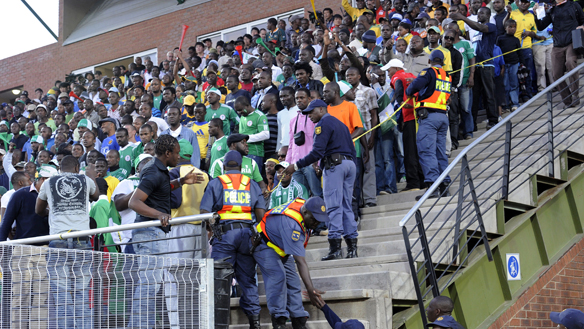
The stage is set for the most riveting match of the African Women’s Championship group stage. Tomorrow (November 4) South Africa take on perennial champions Nigeria. It is a battle between Africa’s powerhouses and fierce rivals. A decade ago, Banyana Banyana and the Super Falcons teams met in an ill-fated AWC final at Vosloorus Stadium, about an hour’s drive from this year’s venues.
On Saturday, November 25, 2000, at least 25,000 spectators packed into the modest Vosloorus stadium. A reporter in attendance described what happened (City Press, 26 November 2000, p. 1):
“The trouble started after unruly, hotheaded Banyana supporters exploded in anger and frustration when Nigeria got their second goal with 18 minutes left on the clock. Local fans considered the goal illegitimate. With Nigeria comfortably up 2-0 in defence of their title, the hotheads started to vent their anger at the assistant referee on the eastern side of the stadium by hurling an assortment of objects, including beer bottles and stones at her. The besieged assistant, in fear of her life, raised her flag to indicate her plight to Cameroonian referee Akono Ondo. Then she sprinted to the safety of the western side, where the other match officials were.
Shortly after this, more objects rained incessantly onto the pitch, clearly aimed at the Nigerians. The situation got further out of control when Nigerian supporters were forced to scurry in all directions in a death-defying scramble from the eastern stands.
Pandemonium broke out when South African and Nigerian fans began hurling abuse and anything they could lay their hands on, including rocks, shoes and umbrellas, at each other. The besieged fans made up largely of many children had to run helter-skelter to avoid the life-threatening stampede. Some of the children were seen tumbling from high up in the stands as the panic-stricken crowd ran in all directions.
The high tension was taken to breaking point by irate fans who constantly pelted the Nigerian players with an array of dangerous objects, thus preventing the match from restarting. Confused match officials, including Safa’s Oliphant and its general manager Dennis Mumble, appealed for calm in the stadium. [. . .]
Once it became evident the game would not resume under the hail of missiles, aimed mainly at the stunned Nigerian players, the embattled officials reluctantly abandoned the game, much to the delight of the Nigerians. As the victors merrily paraded around the field with their trophy, the anarchy and confusion spread to outside the stadium, where wayward fans fought pitched battles.
In the process, police reinforcements came under attack when their vehicles were stoned by a rampaging mob.”
South Africa’s widely celebrated hosting of the 2010 World Cup suggests that a repeat of the violence of 2000 is highly unlikely. However, rampant xenophobia and a 50 percent poverty rate provide kindling that can be ignited by the sparks of football passion and the game’s paradoxical quality to unite while it divides. Check back here for my match report of the Super Falcons – Banyana clash.
Banyana beat Twiga Stars, but only just
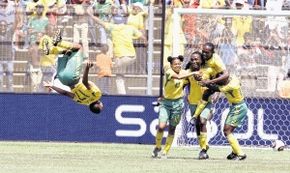
With seven minutes left in the African Women’s Championship opening match between South Africa and Tanzania, the 1-1 stalemate seemed eerily reminiscent of the Bafana-Mexico World Cup opener.
True, the venue was 20,000-seat Sinaba Stadium in Daveyton, east of Johannesburg, and not the 95,000-seat Soccer City Stadium. True, tickets were free (kudos to the organizers). True, nobody on the pitch was a millionaire professional. Still, the capacity crowd’s patriotic fervor demonstrated that continental supremacy and 2011 World Cup qualification are nothing to sneer at.
83 minutes and counting. Banyana Banyana — as the South African women’s team is known — had the Twiga Stars pinned deep in their own end but just could not snap open the valiant visitors’ catenaccio.
Then everything changed. Banyana coach Augustine Makalakalane introduced US-based midfielder Kylie-Ann Louw into the game. Within seconds, Louw collected the ball in the middle of the park, turned and played a ball out wide. She continued her run into the box and received a delightful assist from the right flank. Louw’s one-timed strike was blocked by a Tanzanian defender’s extended arm: penalty! Sitting on the couch, beer in hand, I could almost hear the roar of the crowd above the deafening wailing goats of the vuvuzelas.
Star midfielder Mamello Makhabane, steely eyed yet relaxed, placed the ball on the spot. The weight of the Nation on her shoulders? Makhabane buried the PK with a crisp shot to the goalkeeper’s right. Laduuuuuuma!!
Maybe this is what it would have felt had Bafana’s lone(ly) Katlego Mphela finished his chance against Mexico, instead of hitting the post with a minute left . . .
In the dying moments of the Banyana game, the counter-attacking Twiga Stars got a player sent off for diving — a harsh second yellow according to the TV replay. 2-1 the final score. An exciting finish that must have left at least some television viewers clamoring for more AWC action.
Banyana play Nigeria next in the biggest contest of the group stage. Unfortunately, the 11am kickoff will preclude many, if not most, of us from watching on TV. What a glorious missed opportunity.
RIP Paul The Octopus
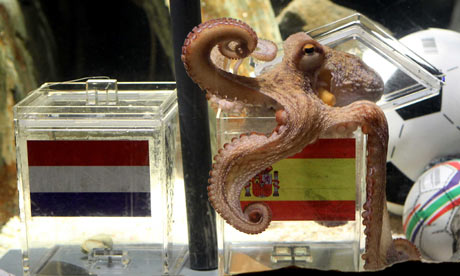
Anti-vuvuzela campaigns in Europe, North America and now South Africa have attacked the most audible symbol of the 2010 World Cup. Yesterday more bad news: Paul The Octopus, the “tentacle tipster” that emerged as one of the tournament’s most popular characters, has died. Paul is dead! Like The Beatles, it was fun while it lasted . . .
Kaizer Chiefs Boss Against Vuvuzelas
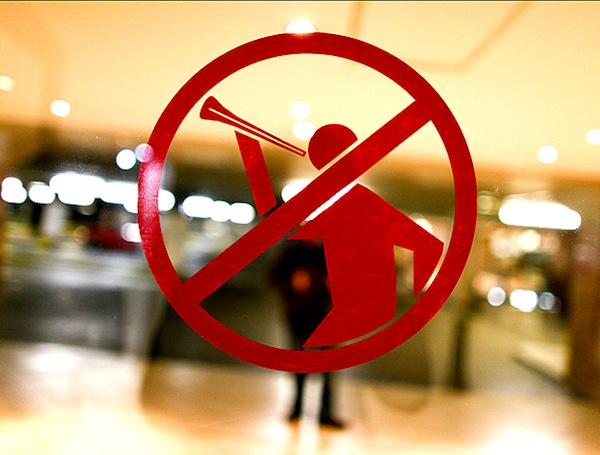
Four months ago the vuvuzela was the symbol of South African football and the Africanization of the World Cup. Now the founder and owner of Kaizer Chiefs — Kaizer Motaung — says publicly that he does not like vuvuzelas at matches.
This statement came in the wake of a 500,000 rand fine imposed on Chiefs by the Premier Soccer League after their fans threw two vuvuzelas (and cabbage) onto the pitch during their MTN8 semi-final loss against Orlando Pirates at Soccer City on September 26. PSL prosecutor Zola Majavu said: “It is only my opinion, but if this trend continues we will have to act more strongly.”
“Vuvuzelas take something away from our games,” said Motaung. “To me, vuvuzelas are just a noisy thing people like, but I prefer to watch fans like Bloemfontein Celtic sing and dance and support their team.”
I’ve noticed fewer vuvuzelas at PSL matches recently so perhaps South African fans are beginning to tire of the decibel-blasting plastic horn. A reader’s comment on the sport24 web site may be indicative that the tide is turning: “True Motaung – Vuvuzelas are a noise making gadget that does not contribute to the game. But do not ban it Majavu. Sooner [rather] th[a]n later people will start leaving their Vuvuzelas at home and start singing at the stadiumz.”
Postings on The Sowetan web site were split on the issue. On the one hand, patriotic populists like Popeye ask: “How can you ban vuvuzela? Recently It has been added to Oxford dictionary . . . [It is] Proudly South African. Rich people can not change the world.” On the other hand, nostalgics like Mthondosheshayo agree with Motaung: “vuvuzelas are not adding anything to our soccer. What happened to the singing, dancing and whistling in the stadiums?”
Writing on kickoff.com — the online edition of the country’s leading football magazine — KaMashobana reminded everyone of the “invented tradition” of the vuvuzela: “Ban them or not, the only truth is Vuvuzelas are not part of our culture. One Boer [Afrikaner] who came with the idea of making money decided to use us. Its only a fool who can stand up and say this instrument is our culture. Where was it in 1996?” when Bafana Bafana triumphed in the African Nations Cup.
Other supporters criticized Motaung’s motives for backing a potential ban of the vuvuzela from South African grounds. “Keep your supporters in check instead of wanting to dictate terms to the rest of us,” wrote KebraNagast. “If you hadn’t gotten the fine you probably wouldn’t have said anything.” Other fans pointed to local football’s culture of defiance to suggest that a ban would not work. “Good Luck with that,” stated a user on the sport24 site. “We all know that in this country we have problems with authority, and the more people tell us not to do things, the more we like to do it.”
Ultimately, a voluntary halt to “doing vuvuzela” would be preferable to prohibition in a country where press freedom is under threat by the proposed Media Appeals Tribunal, the Protection of Information Bill, and the intimidation of reporters.
FIFA Bribes: provisional suspensions
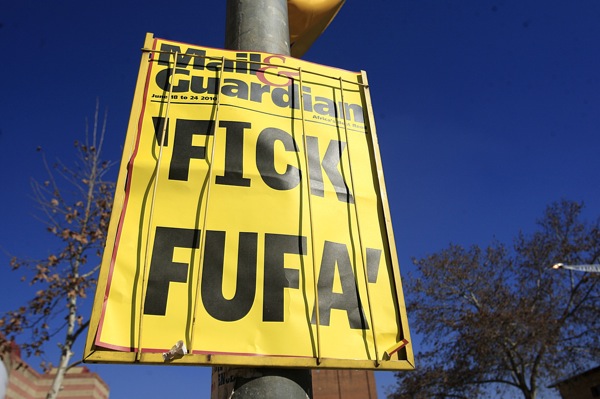
Stung by the revelations of the Sunday Times, FIFA moved into damage control mode on Wednesday. The world body provisionally suspended executive committee members Amos Adamu of Nigeria and Reynald Temarii from Tahiti and four other officials as it investigates the World Cup vote-selling scandal.
A second official from Tahiti, Ahongalu Fusimalohi, is among the four former executive committee members also targeted by the probe. The other men, regrettably, are all Africans: Slim Aloulou (Tunisia), Amadou Diakite (Mali), and Ismael Bhamjee (Botswana). A reminder of how poor governance continues to hinder the progress of African football. And at a time of catastrophic corporate scandals on a planetary scale, this latest mess in Zurich demonstrates again how global sport, business, and politics are inextricably linked.
FIFA’s ethics panel (sic!) is moving quickly with the investigation to limit the negative publicity and to ensure that selection of the hosts of the 2018 and 2022 tournaments goes ahead as planned on December 2.
Read full article here.